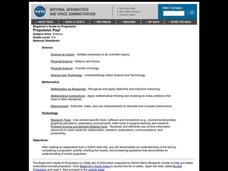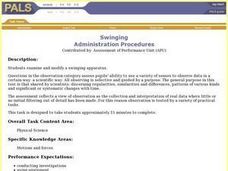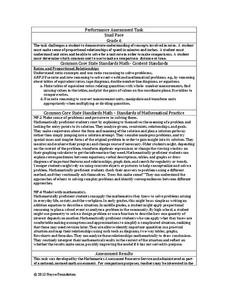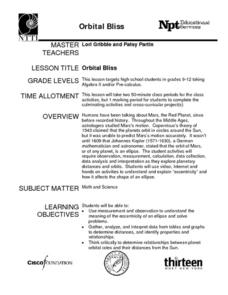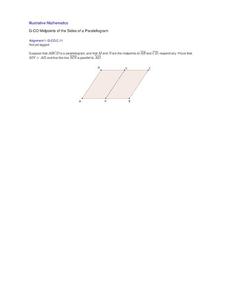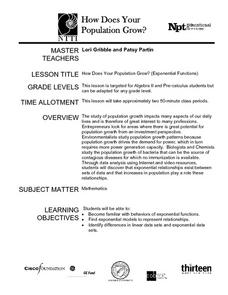Curated OER
Propulsion Pop!
Students demonstrate an understanding of the text by completing a propulsion activity, charting the results, and answering questions that demonstrate an understanding of rocket propulsion.
Curated OER
Calculating Range for a Constant Velocity
Students read an explanation from the NASA Web-based "textbook", The Beginner's Guide to Aerodynamics, then use the information in combination with data from other Web sites to solve single variable equations for distance (range), time,...
Curated OER
Swinging Observations
Students build a pendulum type swinging apparatus and make specific and selective observations using what they know about scientific observations. They look for regularities of movement, patterns, and systemic changes over time.
Curated OER
Rain Drops
Middle schoolers examine drops of water on several materials used on the outside of buildings. They make selective observations on and compare plastic, wood, brick, metal, roof tiles and glass.
Curated OER
Angles and Parallel Lines
In this geometry instructional activity, students identify the different angles formed by cut parallel lines. They name the angles and find the measures of each. There are 24 questions.
Curated OER
social studies: Life in Colonial America
Students explore the trials and tribulations early colonial life and note its successes. Through literature, Internet research, and interactive software, they engage in various activities to evaluate early social and cultural development.
Curated OER
Equivalent Fraction Bingo
Students participate in a game of Fraction Bingo. In this fraction lesson plan, students review equivalent fractions and use these skills to play Fraction Bingo.
Curated OER
Ratios, Proportions, and Percents
Eighth graders use ratios and proportions to solve real-life problems. In this using ratios and proportions to solve real-life problems lesson, 8th graders estimate the cost of a road trip. Students estimate the distance between two...
Curated OER
Planning a Trip
Students plan a trip to from 3 to 5 cities of their choice. They design a brochure to travel to the chosen cities. It should be of a quality that it could be used by a customer to decide if they would like to take this trip.
Noyce Foundation
Snail Pace
Slow and steady wins the race? In the assessment task, scholars calculate the rates at which different snails travel in order to find the fastest snail. Hopefully, your class will move much more quickly in finishing the task!
Curated OER
Tessellations: Geometry and Symmetry
Learners explore the concept of tessellations. In this tessellations instructional activity, students use an applet to construct tessellations. Learners use regular polygons to construct tessellations. Students find patterns and symmetry...
Curated OER
Orbital Bliss
Most young mathematicians are aware that the planets don’t orbit the sun in a circle but rather as an ellipse, but have never studied this interesting feature. This resource looks at the planetary orbits in more detail and helps learners...
Curated OER
The Business of Credit
Learn about credit ratings and how it plays a role in the function of small businesses. Learners use their knowledge of good and bad credit to role play and determine good credit vs. bad credit in the area of small businesses.
Curated OER
Videobusters
A real-world scenario, Videobusters, a video rental store has just got to get organized. In small groups, the class works on organizing and analyzing data utilizing matrices. They need to use their skills in adding, subtracting and...
Illustrative Mathematics
Voting for Two, Variation 1
The votes are in and your mathematicians are going to calculate how many votes each candidate received. Three different solution choices are given, depending on which method is taught. Have your learners set up a table, compute parts, or...
Curated OER
Measuring Activities
Students measure using both metric and standard measures. They convert from one standard to the next while measuring distances in their home or classroom.
Curated OER
"Mind Reader" Math Trick
Students perform a math-based card trick and explain the concepts behind the trick. They video tape classmates performing the trick. Finally, they write a paragraph explaining the trick.
Curated OER
Lotto or Life: What Are the Chances?
Though the website does not seem to have the mentioned video, a reding and lottery style games simulate the chances of finding intelligent life somewhere other than Earth. Without the video, this lesson is short, but it can be a useful...
Alabama Learning Exchange
Fortune Properties
Complete identity and equality property problems in hands-on activities. Smart cookies identify the identity and equality properties. They complete a review of order of operations, watch an online video, and make a foldable with the...
Curated OER
Right on Time
The hour is nigh for your class to practice equivalency problems in the form of time-zone conversions. They write equations to describe elapsed time and apply problem solving strategies, including writing a plan, to solve the problems.
Illustrative Mathematics
Midpoints of the Sides of a Paralellogram
This task asks learners to prove that the segment joining the midpoints of two sides of a parallelogram is both congruent and parallel to an adjacent side of the parallelogram. The activity would be good to use in a discussion about how...
Curated OER
Adding Fractions with Unlike Denominators
Students explore why denominators need to match before adding (or subtracting) a fraction. They use unmarked fraction circles and marked fraction bars, to discover a method to add fractions with unlike denominators using equivalent...
Curated OER
How Does Your Population Grown?
Do you know how the population has grown of your community? Can you predict the population over the next half century? Can we find an algebraic model that matches our data? These along with many more questions can be researched by...
Curated OER
nvestigation - Justin and Daniel's Puzzles
Seventh graders explore area and perimeter, using tangram pieces. They discover the area and perimeter of rectangles and squares. After experimentation, 7th graders write a rule for finding the perimeter and area of squares and rectangles.


